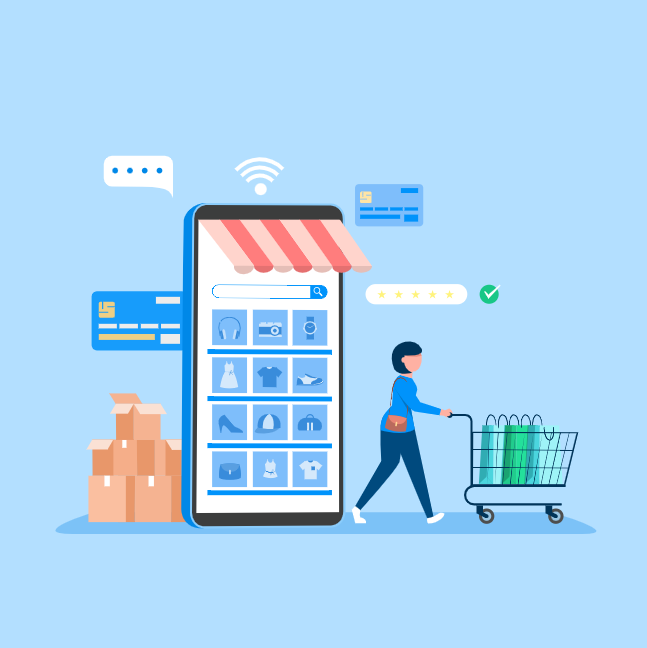Mobile applications are central to eCommerce businesses seeking to remain competitive in a fast-paced digital world. Customers increasingly resort to mobiles to shop, an increasingly popular avenue for developing customer loyalty and an easy shopping experience. The present paper discusses the application in promoting e-commerce, attracting customers, and changing shopping behaviour in the times to come.
Introduction to Mobile Apps in eCommerce
In the last decade, mobile apps have gone from being a luxury to being necessary for brands. With smartphone penetration reaching nearly 100% in some regions, mobile apps provide businesses with a way to get customers directly, anytime, anywhere. As mobile commerce (m-commerce) continues to outpace desktop shopping, companies must leverage mobile apps to remain competitive.
Mobile App Usage Statistics and Trends
The statistics surrounding mobile app usage for eCommerce are staggering. According to recent studies, over 70% of eCommerce traffic now comes from mobile devices, and nearly half of all online sales are made through mobile apps. With the growth of mobile-first consumers, it’s clear that eCommerce businesses need to embrace mobile apps as a key component of their growth strategy.
Benefits of Mobile Apps for eCommerce Businesses
Mobile apps offer several compelling advantages for eCommerce businesses, including:
- Increased Customer Loyalty: Apps allow businesses to strengthen customer relationships. By using personalized recommendations and loyalty rewards, companies can engage customers and encourage them to make repeat purchases.
- Enhanced User Experience: Mobile apps simplify the shopping experience and achieve this often quicker and more intuitively than websites. One-click purchasing, easy navigation, and integrated systems allow involved users to complete purchases quickly and directly.
- Direct Communication via Push Notifications: Push notifications are a powerful tool for customer engagement. It will enable businesses to send instant notices about discounts, product releases, and abandoned shopping carts, encouraging users to return to the app for checkout.
How Mobile Apps Improve Customer Experience
Mobile apps aim to improve user experiences in several ways. The most significant advantage among these is personalization. That’s how mobile device applications and sites now collect details about private client preferences, past browsing behaviours, and shopping behaviours to suggest more items corresponding to those preferences and interests. Such a personalized realm makes shopping fun, with special deals for individual shoppers.
● Streamlining the Shopping Process: Mobile Mobile applications serve as an enabler for shopping. Having stored payment data and autofill options makes purchases so smooth and quick that buyers don’t have to keep entering their payment information every time to complete transactions.
● Integrated Shopping Features: These days, modern eCommerce applications allow you to browse items or order them, as well as wish lists, shopping carts, and even augmented reality (AR) tools. An example AR-based application for a furniture store allows users to know how a sofa looks in their living room before buying one.
Push Notifications and Customer Engagement
Push notifications are one of the most valuable features of mobile apps. These notifications allow businesses to reach their customers directly, offering them exclusive deals, product recommendations, and reminders to complete their purchases. Research shows that push notifications can significantly increase customer retention, as users who opt into notifications are more likely to make repeat purchases.
Future of Mobile Apps in eCommerce
Mobile functionality is constantly being bolstered by novel technologies that form the nuclei of the app. The future of mobile applications in eCommerce is brightening brilliantly. When considering AI inventions at such lengths, these applications for mobile devices can get more personalized, making the shopping experience personally moulded or fashioned for the individual.
Innovations in Mobile App Technology
Artificial intelligence(AI) and machine learning can help the applications predict customer needs and suggest possible products in real-time. For instance, it could monitor customers to see what they are browsing in a physical store or recommend products based on the weather at their location.
The Rise of AR and VR in Shopping Apps
Augmented and virtual reality are transforming people’s shopping, and mobile apps are leading the charge. Customers can now use their smartphones to try on clothes virtually, see how furniture fits in their space, or test makeup products. The ability to visualize products before purchasing is changing the eCommerce game, and it’s likely to grow even more prevalent in the future.
Conclusion
Mobile applications have changed the horizon of eCommerc enhancing shopping experiences, boosting customer loyalty, and driving sales. In the ever-changing mobile commerce landscape, companies that focus on developing user-friendly and innovative applications have a great chance of winning in their competition. By collaborating with a mobile app development company in coimbatore, businesses can leverage cutting-edge mobile strategies to enhance engagement and streamline the shopping experience. The future of mobile apps in eCommerce looks bright, with AI, AR, and VR technologies set to take the customer experience to new heights.


Leave a Reply
You must be logged in to post a comment.